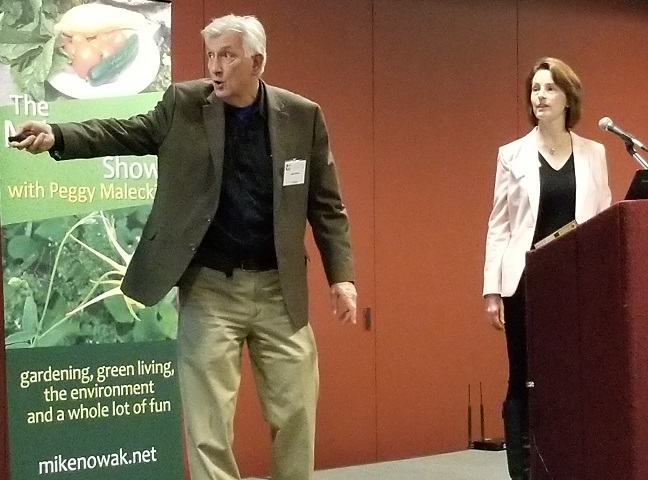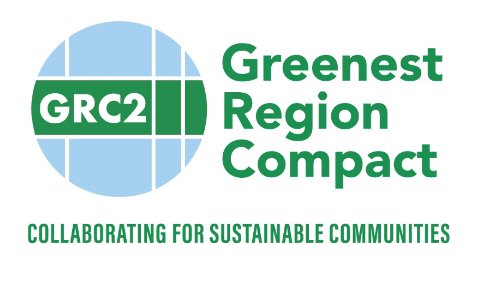GRC2: What If Communities Actually Worked Together to be Sustainable?
GRC2 just hit a milestone.
![]() (July 8, 2018) But before we identify that milestone, here’s a little background information. GRC2 stands for Greenest Region Compact. The “2” after GRC is an acknowledgement that this is the second version of this document, the first having been adopted in 2007. GRC is part of the work of the Environment Committee of the Metropolitan Mayors Caucus, a membership organization of 275 cities, towns and villages in the Chicago region created to improve the quality of life for the millions who live in northeastern Illinois.
(July 8, 2018) But before we identify that milestone, here’s a little background information. GRC2 stands for Greenest Region Compact. The “2” after GRC is an acknowledgement that this is the second version of this document, the first having been adopted in 2007. GRC is part of the work of the Environment Committee of the Metropolitan Mayors Caucus, a membership organization of 275 cities, towns and villages in the Chicago region created to improve the quality of life for the millions who live in northeastern Illinois.
So back to the milestone. Just this week, the Metropolitan Mayors Caucus announced that the number of communities that have signed onto the GRC reached 100. So perhaps we should explain what it’s all about.
The Greenest Region Compact (GRC) promotes sustainability in Chicago communities across the region with an emphasis on building strong and vibrant communities. The foundation of the GRC are 49 high-level goals that have been reached by consensus; not only are the goals aligned with important local, regional, national and global goals, but they also have support from 100 communities that have adopted the GRC…
The GRC’s 49 high-level goals fall into ten sustainability categories: climate, economic development, energy, land, leadership, mobility, municipal operations, sustainable communities, water, and waste & recycling. Municipalities that adopt the GRC are making a commitment to support the consensus goals that have been developed. Specific actions are prioritized and monitored by communities to best suit their own objectives and abilities.
Flexibility and accommodation seem to be a couple of key watch words when it comes to the GRC. For example, there is no reporting requirement for GRC communities and no cost to Metropolitan Mayors Caucus members. In addition, there is something called the GRC Framework, which is a companion document that provides objectives, strategies, and tools to help communities address goals of the GRC. The Framework is flexible, meaning that it fits municipalities of all sizes and resource levels.
Here are a couple of examples of the kind of initiatives that are being adopted as part of GRC:
- Goal – Advance Renewable Energy:
A national designation program, SolSmart recognizes communities that remove local barriers to solar energy and help grow solar markets. The Metropolitan Mayors Caucus led 12 GRC Communities and three counties to work together to earn SolSmart designation by streamlining local permitting, planning and zoning procedures, to make it faster, easier and more affordable for residents and businesses to go solar. Earning SolSmart designation helps municipalities prepare for solar development, an industry that is expected to grow in Illinois by 2,600 percent by the year 2030 because of a new state law.
- Goal – Beautiful Landscapes That Are Good For The Environment:
The remarkable and beautiful monarch butterfly is endangered and new habitat is needed to protect them. GRC Communities are helping to restore the monarch butterfly by creating landscapes where milkweed—a plant vital to the monarch’s survival—can thrive. These landscapes support other native plants that provide nourishment and shelter for other important pollinator insects and birds. Twenty-six GRC Communities are working with volunteer groups to create pollinator habitats along railroad tracks, in subdivisions, in parks and around schools and municipal buildings. These gardens bring together residents of all ages to learn, work together and even enjoy honey from community apiaries such as those in Hanover Park and Westmont.
It doesn’t surprise me that this enterprise is being shepherded by Edith Makra, who is Director of Environmental Initiatives for the Metropolitan Mayors Caucus. I have known her for more than two decades, and watched her in many different roles–board member of America in Bloom, chair of the Illinois Emerald Ash Borer Wood Utilization Team, Community Trees Advocate for the Morton Arboretum, and Special Assistant to Chicago Mayor Richard M. Daley, which included her role in the late, great Department of Environment as Director of Environmental Services.
So if there is a more qualified person for the job at the Metropolitan Mayors Caucus, I can’t imagine who it is. It’s a pleasure to have her on The Mike Nowak Show with Peggy Malecki.
Bringing the Chicago Flower & Garden Show to Taste of Chicago
Taste of Chicago runs from Wednesday, July11 to Sunday, July 15, and this this year there is something a little different at the annual fest. It’s the Humana Farm to Festival exhibit and it features the 811 Chicago Garden.
The Get Growing Foundation and The Chicago Flower & Garden Show have teamed up with the City of Chicago Department of Planning and Development, 811 Chicago (CDOT) and the Greater Chicago Damage Prevention Council to create an inspiring garden designed and built by Christy Webber Landscapes. Daily programming is provided by Chicago Public Schools students, gardening pros and local chefs highlighting local food security initiatives.

A couple of those “gardening pros” just happen to be Peggy Malecki and Mike Nowak. We will be appearing at the exhibit on Friday, July 13 at 11:00 a.m. The name of our talk is How to Answer Any Garden Question. Seriously. So you better show up. By the way, friend of the show William Moss The Garden Boss will be appearing on Saturday at 10:30 a.m.
Daily programming will be provided by Illinois Master Gardeners and Chicago Public Schools students from Chicago High School for Agricultural Sciences, Gale Elementary and Southside Occupational Academy. You can find the full schedule here.
The mission of Get Growing Foundation is to raise awareness of, and funds for, educational programs to educate the public, especially its youth, to be conducted in connection with the annual Chicago Flower & Garden Show.
Located within a ”Farm-to-Festival” addition to the Taste of Chicago visitors will be greeted by educational gardening vignettes featuring messaging on safe digging, pollinators, urban agriculture and more. Educational workshops, locator demonstrations and seminars by industry professionals will be incorporated into the educational garden area.
Mr. Chicago Flower & Garden Show, Tony Abruscato hisself, joins us this morning to talk about how all of this came together. We hope you see you on Friday at the Taste!


